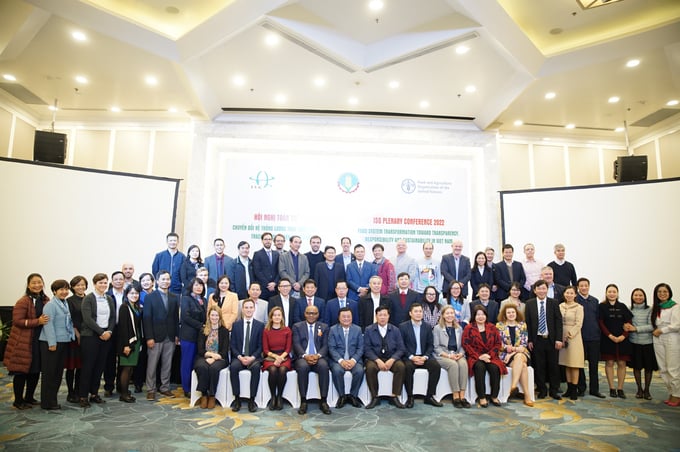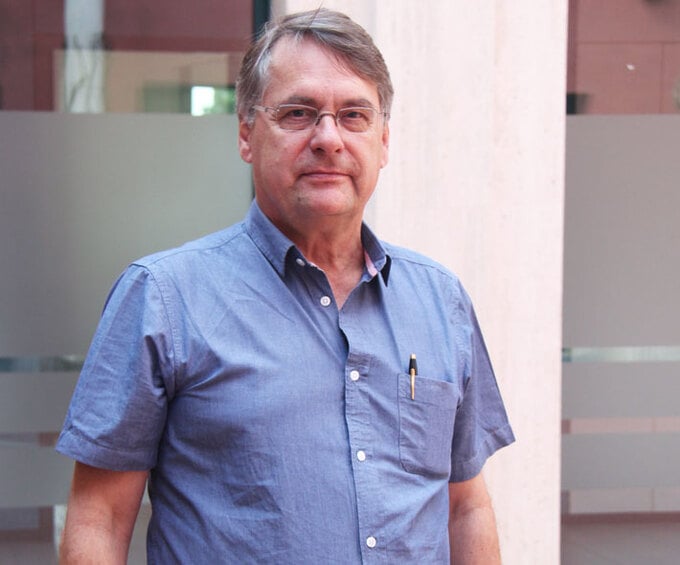November 24, 2025 | 22:59 GMT +7
November 24, 2025 | 22:59 GMT +7
Hotline: 0913.378.918
November 24, 2025 | 22:59 GMT +7
Hotline: 0913.378.918

At the 2022 International Support Program (ISG) Plenary Conference taking place in Hanoi recently, experts Domestically and internationally, experts have exchanged and shared experiences to assist Vietnam in realizing the goals in the National Action Plan to transform the food system towards transparency, responsibility and sustainability.
Changes and adjustments in the vision of Vietnam's agriculture sector are in line with the initiatives of the United Nations. The question is how can we translate that vision now into a National Action Plan. Vietnam is definitely far ahead in comparison to other countries and it is embracing the complexity and difficulties of that process.
Siobhan Kelly, Agribusiness Economist, Food Systems and Food Safety Division FAO

Despite certain differences, Ireland and Vietnam are both countries with strengths in agroproduction. I believe we still have some experiences to share with Vietnam, including the area of food system transformation.
Through the United Nations Food Systems Summit 2021, we recognized Vietnam’s rapid development. We want to direct our cooperative effort of food system transformation, we would like to share about the Sustainable Food System Ireland.
Sustainable Food System Ireland (SFSI) is the international consultancy group of a consortium of five Irish Government organizations, led by the Ministry of Agriculture, Food and the Marine.
SFSI assesses the environmental and social dynamics of the food system, analyzes the information, and then makes recommendations. Next year, through a partnership with SFSI, we will launch a multi-sectoral program of assistance to Vietnam and we intend to build on our previous engagement with stakeholders such as the Ministry of Agriculture and Rural Development (MARD), the Ministry of Planning and Investment, universities and other stakeholders. The objective of this engagement aims to support stakeholders in terms of sustainable food system transformation aspects, including actions identified in the National Action Plan.
We identify three key areas in the program. One is to build a sustainable production system for responsible, green, low-emission agriculture, researching and developing genetics improvement, farming system modeling, and soil health recovery measures. The second aspect is food safety, ensuring access to safe and nutritious food. We have knowledge to share with relevant Vietnamese authorities to stay firmly on the path to food system transformation. The third is to improve the quality of the value chain. We would like to help Vietnam foster innovations and build the innovation hub center.

CGIAR has always actively contributed to the food system transformation action plan. Next year CGIAR sets out on a mission to transfer science and advances that will accelerate the transformation of water, plants and food systems. CGIAR activities are in line with the objectives set out in Vietnam’s National Action Plan.
CGIAR has initiated nine projects and worked with international stakeholders in Vietnam. In addition, we are also developing a program on research and innovations to accelerate the transformation of the food system, which will start in 2023, and Vietnam’s contributions play an important part in this effort.

We are not only raising the issue of food security but also the issue of food safety.
The world's population has reached 8 billion and is likely to reach 9 billion by 2030. WWF has developed a new initiative in partnership with government agencies and submitted it to the 75th UN General Assembly in 2019. The initiative is called “the New Deal for Nature and People”.
As for the reason why we developed this innovative idea, WWF is a global conservation organization. We always questioned the matter of protecting nature, but almost forgot about the matter of people. With the growing economy nowadays, the question lies in how we are going to feed 9 billion people by 2030.
Protecting nature plus dealing with environmental issues is one of the conditions for us to solve the people issue. We care about people, and people will return to care about nature. The ideas came together at the 75th UN General Assembly, world leaders voted for approval, and Vietnam was one of the countries that voiced strong support for the idea.
At the national level, thanks to Minister of Agriculture and Rural Development Le Minh Hoan and the International Cooperation Department, WWF signed a 5-year MoU last year, and this year we have had a temporary Memorandum of Understanding to cooperate not only in protecting biodiversity and the environment but also in ensuring food security – an element that we need to pay close attention.
Translated by Samuel Pham

(VAN) Green transition is crucial for the Mekong Delta amid climate change and stricter standards, offering a path toward sustainability.

(VAN) Dong Thap promotes agricultural restructuring, forms large specialized farming zones, raises the value of agricultural products and develops toward ecological and high-tech directions.
/2025/11/22/4018-4-213342_747.jpg)
(VAN) The Mekong Delta Agricultural Experts Club has attracted 143 experts and researchers to participate in providing consultancy and contributing initiatives to the development of one million hectares of high-quality rice.

(VAN) Ca Mau’s development of OCOP products opens a path to increasing cooperatives value, helping boost income, expand markets, and affirm collective economy's role.

(VAN) Turning seemingly ordinary coconut shells into unique jewelry and artwork, Nguyen Bang Nhi spreads the value of local culture through her brand, Cocohand.

(VAN) Results from the Sustainable Durian Model Project in Dak Lak have confirmed the critical role of Yara Viet Nam in transferring advanced nutritional solutions to farmers.

(VAN) In Tuyen Quang province, livestock farmers have introduced effective models and innovative practices that significantly strengthen African Swine Fever prevention and control efforts.